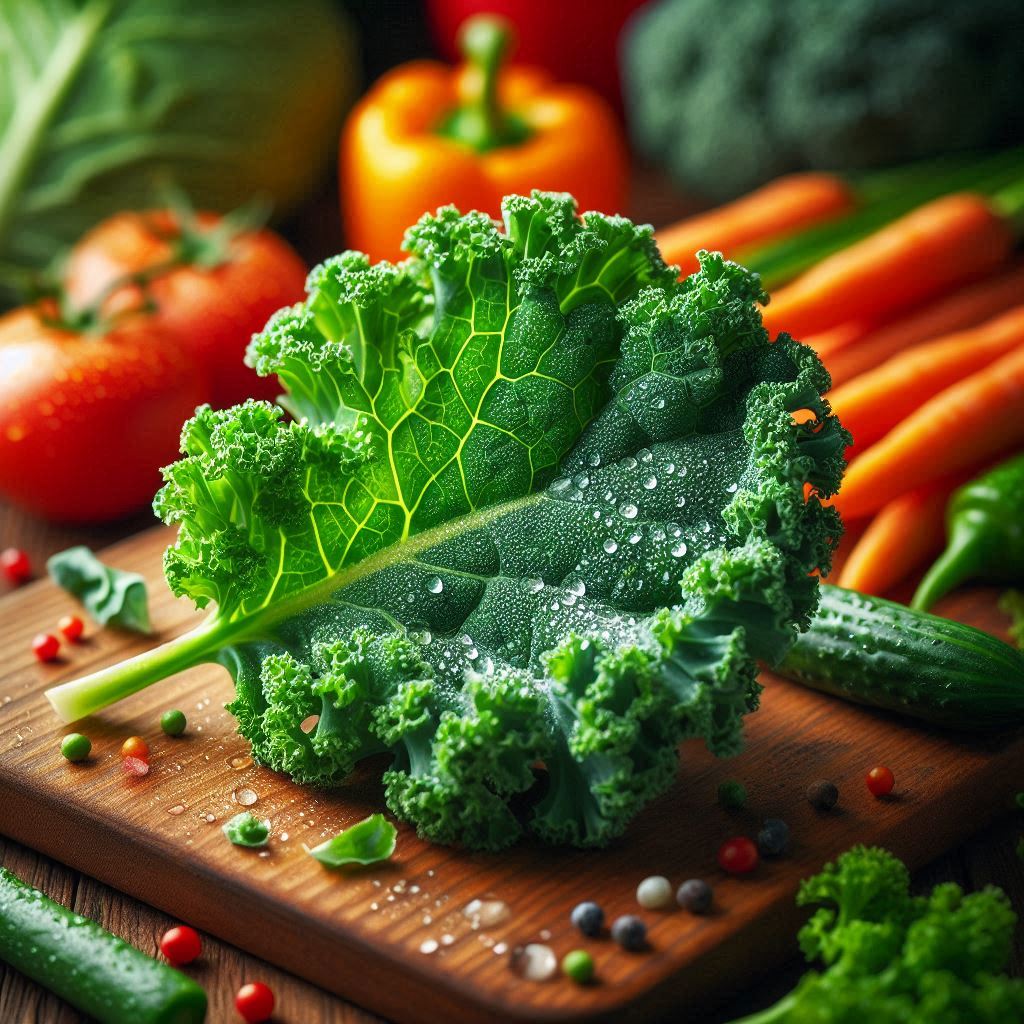Kale: The Ultimate Green Superfood You Should Be Eating Every Day
Kale, often referred to as the “queen of greens,” has taken the health world by storm. This dark, leafy green vegetable has earned its place at the top of the superfood list due to its remarkable nutritional content and numerous health benefits. Belonging to the cruciferous vegetable family, which includes broccoli, cauliflower, and Brussels sprouts, kale is not only incredibly versatile but also packed with vitamins, minerals, antioxidants, and fiber. Whether you’re a health enthusiast or just looking to improve your diet, kale is a must-have in your daily meals. But what exactly makes kale so special, and why should it be a staple in your diet? Let’s explore the incredible benefits of kale and how you can easily incorporate it into your daily routine.
Health Benefits of Kale: A Comprehensive Overview
Kale is often touted as a superfood, and for good reason. Its dense nutritional profile offers a wide range of health benefits that can positively impact various aspects of your well-being. Here’s a detailed look at why kale deserves its superfood status:
1. Rich in Antioxidants: Protecting Your Cells from Damage
Kale is loaded with powerful antioxidants, including beta-carotene, vitamin C, quercetin, and kaempferol. These antioxidants help neutralize free radicals in the body, reducing oxidative stress and lowering the risk of chronic diseases like heart disease, cancer, and neurodegenerative conditions.
- Beta-carotene is a precursor to vitamin A, essential for vision, immune function, and skin health.
- Vitamin C supports the immune system, aids in collagen production, and enhances iron absorption from plant-based foods.
- Quercetin and kaempferol are flavonoids that have been shown to have anti-inflammatory, antiviral, and anticancer properties.
2. Supports Heart Health: Lowering Cholesterol and Blood Pressure
Kale is a heart-healthy food that can help lower cholesterol levels and reduce the risk of heart disease. The high content of fiber and antioxidants in kale helps reduce levels of LDL (bad) cholesterol while increasing HDL (good) cholesterol. Additionally, kale contains potassium, which helps regulate blood pressure by counteracting the effects of sodium.
- Fiber binds to bile acids in the digestive system, preventing them from being reabsorbed into the bloodstream. This process helps lower cholesterol levels.
- Potassium relaxes blood vessel walls and excretes excess sodium, reducing blood pressure and lowering the risk of cardiovascular disease.
3. Excellent Source of Vitamin K: Essential for Bone Health
Kale is one of the best plant-based sources of vitamin K, providing over 600% of the daily recommended intake in just one cup. Vitamin K plays a crucial role in bone metabolism and blood clotting. It helps regulate calcium deposition in bones, contributing to bone strength and reducing the risk of fractures and osteoporosis.
- Vitamin K is essential for the synthesis of osteocalcin, a protein involved in bone mineralization.
4. Supports Detoxification: Cleansing Your Body Naturally
Kale contains compounds like glucosinolates, which support the body’s natural detoxification processes. These compounds help activate enzymes in the liver that detoxify harmful substances, aiding in the elimination of toxins from the body.
- Glucosinolates are broken down into active compounds like sulforaphane and indole-3-carbinol, which have been shown to promote detoxification and have potential anti-cancer effects.
5. Boosts Immune System: Strengthening Your Body’s Defense Mechanisms
Kale is packed with immune-boosting nutrients, including vitamin C, vitamin A, and zinc. These nutrients work together to support the immune system, helping the body fight off infections and illnesses.
- Vitamin A is crucial for maintaining the health of the skin and mucous membranes, which act as the first line of defense against pathogens.
- Zinc supports immune cell function and plays a role in wound healing and protein synthesis.
6. Promotes Healthy Skin: Nourishing from the Inside Out
The combination of vitamin C, vitamin E, and beta-carotene in kale makes it a fantastic food for skin health. These nutrients help protect the skin from oxidative damage, support collagen production, and improve skin elasticity and hydration.
- Vitamin C is essential for collagen synthesis, which helps maintain skin firmness and elasticity.
- Vitamin E acts as an antioxidant, protecting the skin from UV damage and reducing signs of aging.
7. Aids in Weight Management: Low in Calories, High in Nutrients
Kale is a nutrient-dense, low-calorie food that can be an excellent addition to a weight management plan. With only 33 calories per cup, kale provides a significant amount of fiber, which helps promote feelings of fullness and reduces overall calorie intake.
- Fiber slows down digestion, helping you feel full longer and preventing overeating.
How to Incorporate Kale into Your Daily Diet: Practical Tips and Ideas
Kale’s versatility in the kitchen makes it easy to incorporate into your daily meals. Here are some delicious and creative ways to enjoy kale every day:
1. Salads: A Nutritious Base for Any Meal
Kale is a fantastic base for salads, providing a hearty and nutritious alternative to lettuce or spinach. To make kale more tender, massage the leaves with a little olive oil and lemon juice before adding your favorite toppings like nuts, seeds, fruits, and a protein source.
- Tip: For a sweet and savory combination, try a kale salad with roasted sweet potatoes, quinoa, cranberries, and a tahini dressing.
2. Smoothies: A Green Power Boost
Adding kale to your smoothies is an easy way to boost their nutritional content without altering the flavor too much. Blend kale with ingredients like bananas, berries, almond milk, and a scoop of protein powder for a nutrient-packed breakfast or snack.
- Tip: Freeze kale leaves in advance to keep them fresh and make smoothie preparation quicker.
3. Soups and Stews: Adding Nutritional Depth
Kale can be added to soups and stews for an extra dose of greens. Simply chop the leaves and stir them into your favorite vegetable, bean, or meat-based soups during the last few minutes of cooking.
- Tip: Kale pairs well with hearty ingredients like potatoes, beans, and sausage in soups.
4. Kale Chips: A Healthy Snack Alternative
Kale chips are a delicious and healthy alternative to regular potato chips. Simply toss kale leaves with a little olive oil, sprinkle with salt and your favorite seasonings, and bake until crispy.
- Tip: Experiment with different flavors like garlic powder, nutritional yeast, or paprika for a variety of kale chip options.
5. Stir-Fries: Quick and Nutritious
Add kale to your stir-fries for a quick and easy way to increase your vegetable intake. Kale’s sturdy leaves hold up well in high-heat cooking, making them perfect for stir-fries with tofu, chicken, or beef.
- Tip: Use a mix of kale and other vegetables like bell peppers, carrots, and broccoli for a colorful and nutrient-dense stir-fry.
6. Pasta Dishes: A Green Addition
Kale can be easily incorporated into pasta dishes for added nutrition. Whether you’re making a creamy Alfredo, a hearty Bolognese, or a simple garlic and olive oil pasta, tossing in some kale adds texture and nutrients to the dish.
- Tip: Sauté kale with garlic and olive oil before mixing it into pasta for added flavor.
Potential Disadvantages of Kale: Things to Consider
While kale is undoubtedly a superfood, there are a few considerations to keep in mind when incorporating it into your diet:
1. High in Oxalates: Potential Kidney Stone Risk
Kale contains oxalates, which can contribute to the formation of kidney stones in susceptible individuals. If you have a history of kidney stones or are at risk, it’s important to monitor your kale intake and ensure you’re drinking plenty of water to help flush oxalates from your system.
- Tip: Cooking kale can reduce its oxalate content, making it a safer option for those concerned about kidney stones.
2. Thyroid Function: Goitrogenic Effects
Kale belongs to the cruciferous vegetable family, which contains goitrogens—substances that can interfere with thyroid function by inhibiting iodine uptake. While this is typically not a concern for most people, those with thyroid conditions should be mindful of their kale consumption, especially in raw form.
- Tip: Cooking kale can deactivate goitrogens, reducing the risk of thyroid interference.
3. Pesticide Residue: Choosing Organic Options
Kale has been listed as one of the vegetables with a higher likelihood of pesticide residue. To reduce exposure to harmful chemicals, it’s advisable to choose organic kale whenever possible or wash non-organic kale thoroughly before consumption.
- Tip: Soak kale in a mixture of water and vinegar for a few minutes to help remove pesticide residues.
Nutritional Values of Kale:
Here’s the complete table of nutritional values for kale per 100 grams:
| Nutrient | Amount per 100g | % Daily Value |
|---|---|---|
| Calories | 33 kcal | 2% |
| Total Fat | 0.6 g | 1% |
| – Saturated Fat | 0.1 g | 1% |
| – Polyunsaturated Fat | 0.3 g | – |
| – Monounsaturated Fat | 0.1 g | – |
| Cholesterol | 0 mg | 0% |
| Sodium | 29 mg | 1% |
| Total Carbohydrate | 6.7 g | 2% |
| – Dietary Fiber | 4.1 g | 16% |
| – Sugars | 1.2 g | – |
| Protein | 2.9 g | 6% |
| Vitamins and Minerals | ||
| – Vitamin A | 4812 IU | 96% |
| – Vitamin C | 120 mg | 200% |
| – Vitamin E | 0.7 mg | 3% |
| – Vitamin K | 704.8 µg | 881% |
| – Vitamin B6 | 0.2 mg | 9% |
| – Folate | 62 µg | 15% |
| – Calcium | 150 mg | 15% |
| – Iron | 1.5 mg | 8% |
| – Magnesium | 47 mg | 12% |
| – Potassium | 491 mg | 14% |
| – Copper | 0.2 mg | 10% |
| – Manganese | 0.7 mg | 34% |
Summary: Why Kale Deserves a Place on Your Plate
Kale truly lives up to its reputation as a superfood. Packed with essential vitamins, minerals, antioxidants, and fiber, it offers a myriad of health benefits that support heart health, bone health, detoxification, immune function, and more. Whether you’re aiming to boost your overall health, manage your weight, or simply add more nutrient-dense foods to your diet, kale is a versatile and delicious option.
Incorporating kale into your daily meals is easy, thanks to its adaptability in various dishes, from salads and smoothies to soups and stir-fries. While there are a few considerations, such as its oxalate content and goitrogenic effects, these can be managed with mindful consumption and preparation.
Overall, kale is a nutritional powerhouse that can enhance your diet and contribute to a healthier lifestyle. So, next time you’re at the grocery store, be sure to pick up some fresh kale and start reaping its incredible benefits today!
*Disclaimer: The information provided in this article is for educational and informational purposes only and should not be construed as health advice. The content is solely the personal opinion of the author and is not intended to be a substitute for professional medical advice, diagnosis, or treatment. Always seek the advice of your physician or other qualified health provider with any questions you may have regarding a medical condition or before starting any new diet or treatment. Read more




Post Comment